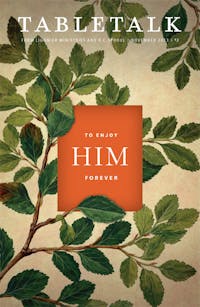
Request your free, three-month trial to Tabletalk magazine. You’ll receive the print issue monthly and gain immediate digital access to decades of archives. This trial is risk-free. No credit card required.
Try Tabletalk NowAlready receive Tabletalk magazine every month?
Verify your email address to gain unlimited access.
Abraham, we are told, looked for a city whose builder and maker is God (Heb. 11:10). Jesus promised us that He was going to prepare a place for us (John 14:3). And when history draws to its close, a great city, the New Jerusalem, will descend from on high (Rev. 21:2). Is it any wonder that we, like Pilgrim before us, see our walk as a metaphor, a journey to the celestial city? And is it not just a short step to then conclude that our call to seek first the kingdom of God is a call to make our way there?
There is not a thing in the world wrong with these spatial kinds of metaphors. One does not complain when the Holy Spirit uses a word picture. There is, however, an associated danger. We are indeed on a journey. But we are going to a Person more than a place. To seek first the kingdom is less about getting there or building the kingdom and more about seeking the King. We will arrive not when we pass by the sign at the edge of town, but when we are embraced in our Savior’s arms.
The glory of the gospel in like manner, is less the glory of how we have peace with God and more the glory that we have peace with God. The good news is not just the forgiveness of sins, but also our adoption as sons. Our religion is not a relationship, but a joining of the relationship. We are brought, by God’s grace and without becoming God ourselves, into the very family of God.
Over the years, it has been my habit when speaking here and there at conferences and in worship services to offer up a little gift to those in attendance. It’s an outline of the entire Bible. It’s time I offered it here:
I. Genesis 1–2: Creation
II. Genesis 3: Fall.
III. Genesis 4–Revelation 22: Trying to get back to Genesis 1–2, only better.
History is the story of getting back to the garden. History ends at the beginning. I fear that we fear eternity, that we are reluctant to go where we are going, that it might grow boring precisely because we have missed the beauty of where we came from. We do not look forward to heaven because we do not look backward to the garden.
In the garden we were, first, without sin. Before my wife’s passing, she asked if I thought she would be able to recognize those who had gone before her to heaven. I explained: “Dear, I’m pretty sure I won’t recognize myself when I get to heaven. Me I know. Me without sin, I can’t imagine what that would look like.” What an astonishing thing it will be when we get home and find we have left sin behind. In one sense we won’t recognize ourselves. In another, however, we will finally be what we always were. We will come into our own. We will shed our fallen nature completely, and recall our created nature.
In the garden we were, second, in harmony with the world and with one another. In the garden, not only did the lion and lamb lie down together, but so did the husband and wife. Human relationship was untouched by death, by sickness, by sin. There was no need to be or to feel defensive, no need to guard one’s “rights.” And so it will be in the consummated kingdom. All our relationships will be unsullied by sin or fear. We will be at peace. Thorns and thistles will be banished, and there will be no more sweat on our brows. All will be well.
All of this, however, Adam and Eve, before their fall, and we, after our glorification, would trade for the one glory above all others—we will walk with Him in the cool of the evening. The glory of eternity is that we will be with Him. We will see His face and live (Rev. 22:4). Better still, we will see Him as He is, and be made like Him.
The kingdom, however, is not merely future but present. Our sanctification is nothing other than becoming more what we will be. Our living out the “one anothers” here on earth is nothing other than doing what we will do. And our living coram Deo, before the face of God, is nothing other than how and where we will live then. Our progress as pilgrims is measured not by miles but by veils. For now we see through them darkly. But as we grow in grace, as we seek first His kingdom and His righteousness, the veils are progressively removed.
The glory first begins to peek through, giving only hints of what is to come. But as we descend into the vale, the veils begin to drop, and eyesight which had begun to grow dim becomes faith sight that now beholds the Shekinah.
Pray that He would give us eyes to see what eye has not seen. Pray that He would give us ears to hear what ear has not heard. Pray that He would give us minds to grasp, even just a hint, all that He has promised to His beloved. Pleasures Evermore sits at His right hand.
